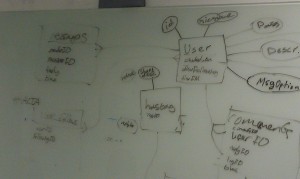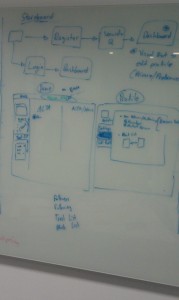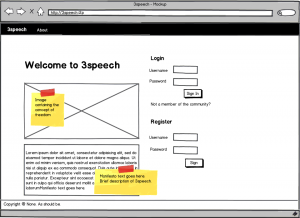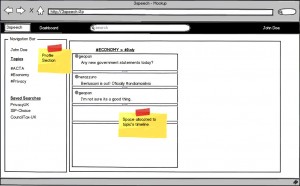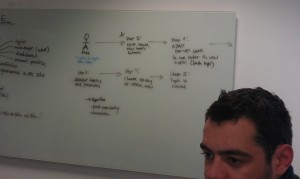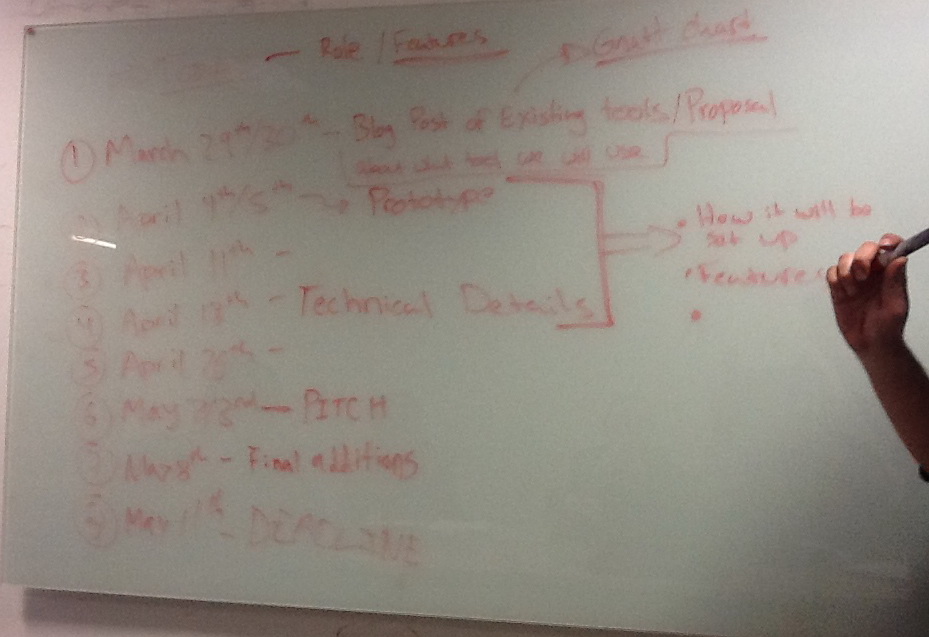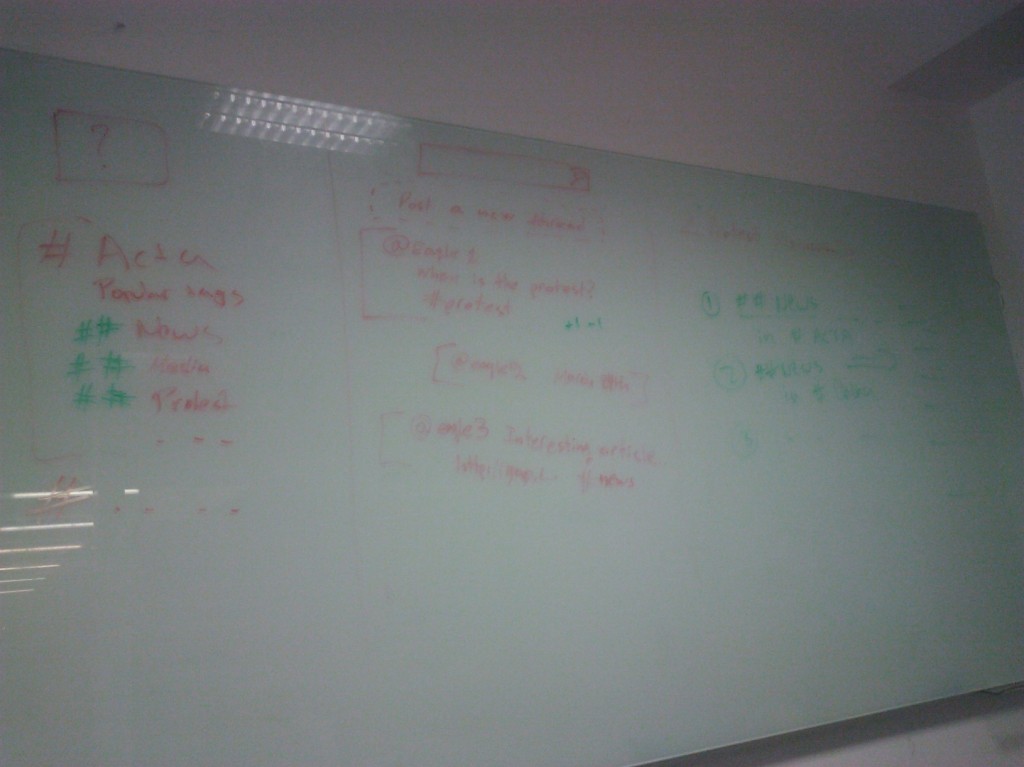Meeting #5
Posted by drakopoulos in Group Meetings on April 15, 2012
During this meeting we started designing the database for 3speech and also discussed some of the navigation issues and the user interface. Progress is being made and things are starting to come together.
A Selection of Relevant News Articles
Posted by drakopoulos in News & Media on April 14, 2012
The Fight Against Copyright Enforcement & The Fight For Civil Liberties Are The Same
Internet Companies Warn Against Government Email Surveillance Plans
Tor vs. I2P: The Great Onion Debate
China Bans Comments On Twitter Style Services Until April 3rd
Rogue Nodes Turn Tor Anonymizer Into Evesdropper’s Paradise
How The Copyright Industry Drives A Big Brother Dystopia
Social Networks Must Require Real Names
Anonymous Operating System Prompts Security Warnings
AnonPlus: The Anonymous Social Network
Google+ Activism: Four Reasons Google+ Will Improve Organizing
Questionnaire
Posted by drakopoulos in Other on April 14, 2012
We came up with a set of questions revolving around our project and the issue we are dealing with, in order to gauge public opinion on the matter and gain further insight into who the potential users would be. This was not conducted as a survey, but rather as interviews with various individuals (university students and working professionals).
The following questions were asked:
1a. How would you characterize your usage of social networks?
1b. On a scale of 1 to 5 how active do you consider yourself on the social networks?
2. What social networks do you normally use and why?
3. What is your biggest concern regarding social network usage?
4. When signing up for a social network, do you read the Terms and Conditions? Why?
5. How important do you consider the right of freedom of speech?
6. Do you believe that same right to freedom of speech that exists in the physical world should also apply online?
7. What are your views of the current state of online freedom of speech and do you feel that it is being threatened?
8a. Have you ever refrained from posting something controversial (opinion/video/news article etc.) on the social networks?
8b. If so, why?
9. To what extent do think that your online activities on social networks are being monitored by the authorities?
10. Would you participate in a discussion online about a sensitive/controversial topic?
11. What are your views on censorship and do you believe that it is sometimes necessary? Please provide any relevant examples.
12. “You cannot guarantee freedom of speech and enforce copyright law.” Do you agree or disagree with this statement and why?
13. “You cannot have freedom of speech without the option to remain anonymous.” Do you agree or disagree with this statement and why?
14. If there was a social network that both allowed the users to remain anonymous and truly protect freedom of speech, would you participate and why?
Mockups – Visualizing 3speech
Posted by epan in Front-end Design on April 11, 2012
Based on design principles presented in the User Interface Considerations post, we created mockup screenshots of how 3speech will look and feel to users. Mockups are simple way to visualize core webpage elements and can have a great impact on resolving navigation issues. The figures below present what we came up and constitute a starting iteration point on our user interface design path. Figure 1 presents the login page for 3speech, while Figure 2 displays the user’s projected timeline.
Meeting #4
Posted by drakopoulos in Group Meetings on April 3, 2012
This meeting was focused on deciding the functionalities of the network and how they would be implemented into the prototype. Some of the main discussion points are listed below:
- How is this going to be different from accessing Facebook via Tor?
- How long will we hold information for?
- Not allow users to search for other users.
- Followers are going to be based on topic, not on user.
- Trusted users.
- The site is NOT about making friends, its about sharing information.
Goals for next week:
- Logo
- Think about how to design database
User Interface(UI) Research
Posted by epan in Front-end Design on April 2, 2012
User Interface design is a research area that has drawn the attention of the academic community even before the Web came into life. When talking about front end design, people misunderstand the concept as CSS / JavaScript coding to some extent. However, these technologies are just the means to reach the desired result, to create an intuitive user experience.
Users should be able to understand the scope of the application and become familiar with the structure of information presentation and navigation scheme. These principles were presented as a result of research early on [1], and have been adopted as part of user interface principles ever since.
In particular for web applications, Nielsen [2] pointed out the need to train people on web design best practices otherwise the web would become dysfunctional from a poor design point of view. Marcus and Gould [3] broaden the research agenda on user interfaces introducing culture as another potential consideration when designing for the web. Moreover, Zhang et al[4] proposed a theoretical framework on web user interface design and evaluation, adding the notion of user satisfaction as one the key point on whether users revisit websites. User interface design evaluation seems a hard issue to tackle and Neurkar [5] suggested that web UI researchers should learn from previous Graphical User Interface approaches used in desktop applications. One of the important findings comparing the above design methods was that response time on the Web was a fact that contributed to worse user experience on the web compared to desktop applications. What created a “buzz” and became along the way a standard technology tool was AJAX, short for Asynchronous Javascript and XML. Webpages built with AJAX simulate the desktop application experience [6], as sections of the webpage can be reloaded without the need to refresh the page, leading to a more consistent user experience.
Recently, research on mobile web user interface design has presented concepts such as responsive web design, the need to design different webpage layouts based on the screen size of the user’s agent. This is mainly due to the fact that smartphone market share is expected to overcome desktop computers in 2012[7].
Nevertheless, the ultimate design goal is to create an intuitive user experience. The targeted platform typically endorses restraints as to how elements will behave on the webpage. Our social network runs on i2p, therefore mobile considerations are not in order for now. A typical user case involves navigation through a desktop web browser, with a mouse and a keyboard.
As a result, we need not to target any mobile platform, but instead create the best possible user experience on a desktop web browser.
References:
[1] Nievergelt, J., and Weydert, J. Sites, modes and trails: Telling the user of an interactive system where he is, what he can do, and how to get to places. Methodology of Interaction. R.A. Guedj, P.J.W. ten Hagen, F.R.A. Hopgood, H.A. Tucker, and D.A. Duce, (Eds.). North Holland, (1980), 327–338.
[2] Jakob Nielsen. 1999. User interface directions for the Web. Commun. ACM 42, 1 (January 1999), 65-72.
[3] Aaron Marcus and Emilie West Gould. 2000. Crosscurrents: cultural dimensions and global Web user-interface design. interactions 7, 4 (July 2000), 32-46.
[4] Ping Zhang; Small, R.V.; von Dran, G.M.; Barcellos, S.; , “Websites that satisfy users: a theoretical framework for Web user interface design and evaluation,” System Sciences, 1999. HICSS-32. Proceedings of the 32nd Annual Hawaii International Conference on , vol.Track2, no., pp.8 pp., 1999
[5] Nerurkar, U.; , “Web user interface design, forgotten lessons,” Software, IEEE , vol.18, no.6, pp.69-71, Nov.-Dec. 2001
[6] Paulson, L.D.; , “Building rich web applications with Ajax,” Computer , vol.38, no.10, pp. 14- 17, Oct. 2005
[7] IDC: Press Release 2011. Smartphone market share. [Online] Available at: http://www.idc.com/getdoc.jsp?containerId=prUS22871611 [Last accessed 06/05/2012]
Meeting #3
Posted by drakopoulos in Group Meetings on March 21, 2012
Having decided on what we would be building (an anonymous social network), this meeting was focused on discussing the technical details of 3speech. From the previous meeting, we had assigned a network to each member to research (Tor, I2P, Freenet etc.), using this research we created a list of pros and cons for each and then had a group discussion about which network we should select. After much debate, we narrowed it down to either Tor or I2P and ultimately settled on I2P.
For the remainder of the meeting, we started creating some storyboards for potential users.
Moving Forward
Posted by epan in Group Meetings on March 14, 2012
After our second group meeting, there is a common belief amongst the group members that we are heading to the right direction. Having started from a brainstorm session where ideas on features were still in an abstract form, finally it seems like we have managed to target our creativity towards a more concrete level, augmenting our understanding on issues that may come down the road and getting a feeling of what BlackBox* is all about. Talking on behalf of the group, our mentor has been an invaluable asset, keeping the thought process on track and providing us with helpful advice and resources.
Since the Easter break is not far away, we decided to set specific milestones until the project deadline, in order to stay focused on our research and tackle every issue on time. By breaking up tasks into smaller parts, each member of our group was assigned with research on a specific area, starting from the analysis of existing tools that can help us to identify different approaches and possible weaknessess.
Since we all feel like 3speech could go beyond the scale of a module project, user experience is considered one the most important aspects of our work. Working together, we defined a layout that will enhance the look and feel of our social network. The picture below presents what we came up for today. Of course, this is an iterative process but it feels good to be able to visualise core components of the network such as navigation and easy access of personalised topics of interest for users.
Finally, the next steps we need to take include gathering of relevant sources of information, creating a mock up of the UI and addressing implementation issues.
Moving forward, there is a high level of enthusiasm and a solid belief in this project.
Project Brief
Posted by drakopoulos in Welcome and project brief on March 8, 2012
Over the last couple of years there have been numerous occasions of people being prosecuted by the authorities for expressing their opinions online. For example:
•Two months ago, two British citizens got banned from entering the United States for making a joke about ‘destroying America’ on Twitter.
Story
•Twitter recently changed its policy, saying that it would begin censoring tweets on a country by country basis.
Story
•Three activists from Hong Kong had their accounts suspended from Facebook, for creating a group on the site that was in opposition to the development of luxurious housing in their area.
Story
The major social networks are clamping down on references to activism and even banning members for taking part in these discussions. We propose ‘3speech’, a secure social network that keeps your identity private and allows you to discuss potentially controversial issues and share your ideas without fear.
The driving force behind this idea is to preserve online freedom of speech, in light of recent attempts to monitor and censor online activities. BlackBox will use the Tor network in order to protect the identities of the users within the community.
In relation to the previous examples, the ‘victims’ were penalized for freely expressing themselves. In BlackBox, we value open discussion, we value open dialogue and free speech. People will not be judged for sharing their ideas, on the contrary, we encourage collaboration and discussion on anything you feel worthwhile. We looking forward to a democratic, no administrated social network that it could stand on its own.
It’s about the topic, not the people. The cause we are promoting is to get involved with what is happening globally. Get informed. Get engaged. Share thoughts freely. Freedom of speech is your right.
Talk about it.
